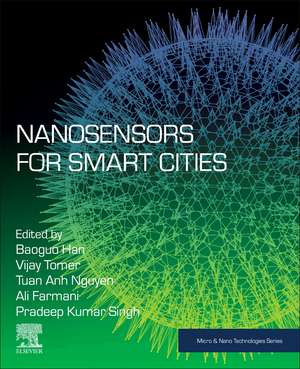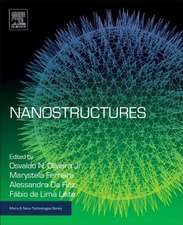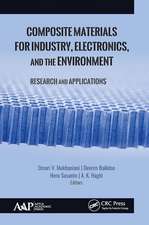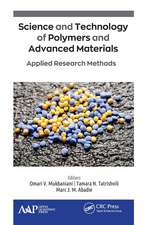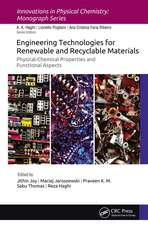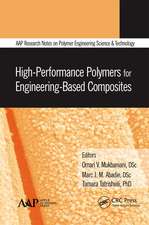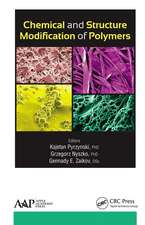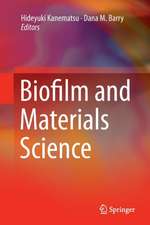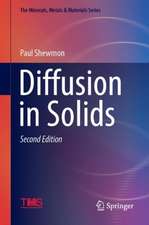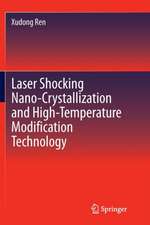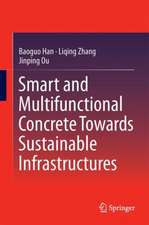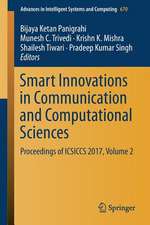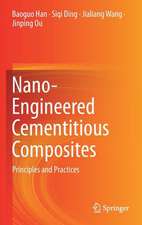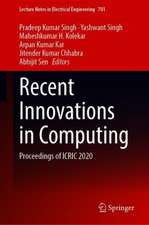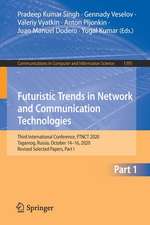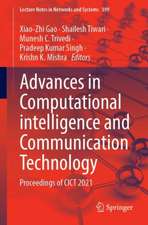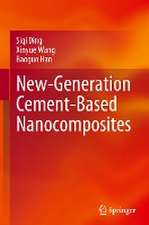Nanosensors for Smart Cities: Micro and Nano Technologies
Editat de Baoguo Han, Vijay Tomer, Tuan Anh Nguyen, Ali Farmani, Pradeep Kumar Singhen Limba Engleză Paperback – 18 feb 2020
Nanomaterials based sensors (nanosensors) can offer many advantages over their microcounterparts, including lower power consumption, high sensitivity, lower concentration of analytes, and smaller interaction distance between object and sensor. With the support of artificial intelligence (AI) tools, such as fuzzy logic, genetic algorithms, neural networks, and ambient-intelligence, sensor systems are becoming smarter.
- Provides information on the fabrication and fundamental design concepts of nanosensors for intelligent systems
- Explores how nanosensors are being used to better monitor and maintain infrastructure services, including street lighting, traffic management and pollution control
- Assesses the challenges for creating nanomaterials-enhanced sensors for mass-market consumer products
Din seria Micro and Nano Technologies
- 9%
 Preț: 987.08 lei
Preț: 987.08 lei - 24%
 Preț: 1048.26 lei
Preț: 1048.26 lei - 9%
 Preț: 1043.14 lei
Preț: 1043.14 lei - 20%
 Preț: 768.40 lei
Preț: 768.40 lei - 23%
 Preț: 1100.40 lei
Preț: 1100.40 lei - 28%
 Preț: 738.06 lei
Preț: 738.06 lei - 23%
 Preț: 692.90 lei
Preț: 692.90 lei - 28%
 Preț: 571.91 lei
Preț: 571.91 lei - 38%
 Preț: 649.93 lei
Preț: 649.93 lei - 28%
 Preț: 825.39 lei
Preț: 825.39 lei -
 Preț: 222.86 lei
Preț: 222.86 lei - 16%
 Preț: 290.93 lei
Preț: 290.93 lei - 23%
 Preț: 734.77 lei
Preț: 734.77 lei - 28%
 Preț: 811.47 lei
Preț: 811.47 lei - 16%
 Preț: 766.36 lei
Preț: 766.36 lei - 28%
 Preț: 934.58 lei
Preț: 934.58 lei - 32%
 Preț: 528.10 lei
Preț: 528.10 lei - 23%
 Preț: 810.11 lei
Preț: 810.11 lei - 9%
 Preț: 571.98 lei
Preț: 571.98 lei - 23%
 Preț: 603.19 lei
Preț: 603.19 lei - 19%
 Preț: 659.03 lei
Preț: 659.03 lei - 18%
 Preț: 653.54 lei
Preț: 653.54 lei - 23%
 Preț: 746.61 lei
Preț: 746.61 lei - 9%
 Preț: 1016.51 lei
Preț: 1016.51 lei - 29%
 Preț: 989.78 lei
Preț: 989.78 lei - 28%
 Preț: 737.80 lei
Preț: 737.80 lei - 9%
 Preț: 848.26 lei
Preț: 848.26 lei - 9%
 Preț: 736.59 lei
Preț: 736.59 lei - 29%
 Preț: 803.90 lei
Preț: 803.90 lei - 9%
 Preț: 963.06 lei
Preț: 963.06 lei - 28%
 Preț: 644.55 lei
Preț: 644.55 lei - 23%
 Preț: 813.30 lei
Preț: 813.30 lei - 23%
 Preț: 608.83 lei
Preț: 608.83 lei - 9%
 Preț: 683.99 lei
Preț: 683.99 lei - 9%
 Preț: 792.39 lei
Preț: 792.39 lei - 23%
 Preț: 732.00 lei
Preț: 732.00 lei - 23%
 Preț: 909.30 lei
Preț: 909.30 lei - 9%
 Preț: 733.82 lei
Preț: 733.82 lei - 28%
 Preț: 698.33 lei
Preț: 698.33 lei - 23%
 Preț: 937.71 lei
Preț: 937.71 lei - 23%
 Preț: 692.32 lei
Preț: 692.32 lei - 24%
 Preț: 869.31 lei
Preț: 869.31 lei - 23%
 Preț: 609.24 lei
Preț: 609.24 lei - 18%
 Preț: 222.37 lei
Preț: 222.37 lei - 28%
 Preț: 816.40 lei
Preț: 816.40 lei - 9%
 Preț: 811.32 lei
Preț: 811.32 lei - 21%
 Preț: 292.28 lei
Preț: 292.28 lei - 9%
 Preț: 807.78 lei
Preț: 807.78 lei - 5%
 Preț: 637.68 lei
Preț: 637.68 lei - 34%
 Preț: 189.43 lei
Preț: 189.43 lei
Preț: 1149.38 lei
Preț vechi: 1263.06 lei
-9% Nou
Puncte Express: 1724
Preț estimativ în valută:
219.96€ • 227.23$ • 183.06£
219.96€ • 227.23$ • 183.06£
Carte tipărită la comandă
Livrare economică 18 martie-01 aprilie
Preluare comenzi: 021 569.72.76
Specificații
ISBN-13: 9780128198704
ISBN-10: 0128198702
Pagini: 962
Dimensiuni: 216 x 276 mm
Greutate: 1.34 kg
Editura: ELSEVIER SCIENCE
Seria Micro and Nano Technologies
ISBN-10: 0128198702
Pagini: 962
Dimensiuni: 216 x 276 mm
Greutate: 1.34 kg
Editura: ELSEVIER SCIENCE
Seria Micro and Nano Technologies
Public țintă
Academics and R&D industry researchers in the fields of materials science and engineeringCuprins
PART 1: BASIC PRINCIPLES
1. Nanosensors for smart cities: An introduction
2. Advanced Methods for Design and Fabrication of nanosensors
3. Methods for design and fabrication of nanosensors and their electrochemical applications on pharmaceutical compounds
4. Methods for characterization and evaluation of Chemoresistive nanosensors
5. Tools and techniques for characterization and evaluation of nanosensors
6. Nanoscale interface techniques for standardized integration
7. A novel triboelectric nanogenerator based on electrospun nanofibers and its application as a self-powered nanosensor
PART 2: NANOSENSORS FOR MONITORING AND MANAGING THE REGULAR OPERATIONS AND SERVICES
8. Conducting polymer based nanobiosensors
9. Magnetic nanosensors and their potential applications
10. Fabrication and functionalization of nanochannels for sensing applications
11. Nanosensors for traffic condition monitoring
12. Nanosensors for street lighting system
13. Nanosensors for Structural Health Monitoring
PART 3: NANOSENSORS FOR SAFE CITIES
14. Nanosensors for monitoring indoor pollution in smart cities
15. Nanosensors for Monitoring Environmental Pollutions
16. Nanosensors for water safety
17. Electrochemical virus detections with nanobiosensors
18. Nanosensors for the detection of viruses
19. Nanosensors for food safety
20. Application of Nanosensors for Food safety
21. Nanosensor Networks for Smart Health Care
22. Nanosensor Networks for Health Care Applications
23. Optical nanosensors for cancer and virus detections
24. Nanosensors for health care
25. SERS Nanosensor for Environmental Pollutions
26. Nanosensors for exhaled breath monitoring as a possible tool for noninvasive diabetes detection
27. Chemo/Bio nanosensors for medical applications
PART 4: NANOSENSORS FOR HEALTHY CITIES
28. Municipal Wireless Sensor Networks
29. Crowdsensing architectures for smart cities
30. Participatory Sensing Framework
1. Nanosensors for smart cities: An introduction
2. Advanced Methods for Design and Fabrication of nanosensors
3. Methods for design and fabrication of nanosensors and their electrochemical applications on pharmaceutical compounds
4. Methods for characterization and evaluation of Chemoresistive nanosensors
5. Tools and techniques for characterization and evaluation of nanosensors
6. Nanoscale interface techniques for standardized integration
7. A novel triboelectric nanogenerator based on electrospun nanofibers and its application as a self-powered nanosensor
PART 2: NANOSENSORS FOR MONITORING AND MANAGING THE REGULAR OPERATIONS AND SERVICES
8. Conducting polymer based nanobiosensors
9. Magnetic nanosensors and their potential applications
10. Fabrication and functionalization of nanochannels for sensing applications
11. Nanosensors for traffic condition monitoring
12. Nanosensors for street lighting system
13. Nanosensors for Structural Health Monitoring
PART 3: NANOSENSORS FOR SAFE CITIES
14. Nanosensors for monitoring indoor pollution in smart cities
15. Nanosensors for Monitoring Environmental Pollutions
16. Nanosensors for water safety
17. Electrochemical virus detections with nanobiosensors
18. Nanosensors for the detection of viruses
19. Nanosensors for food safety
20. Application of Nanosensors for Food safety
21. Nanosensor Networks for Smart Health Care
22. Nanosensor Networks for Health Care Applications
23. Optical nanosensors for cancer and virus detections
24. Nanosensors for health care
25. SERS Nanosensor for Environmental Pollutions
26. Nanosensors for exhaled breath monitoring as a possible tool for noninvasive diabetes detection
27. Chemo/Bio nanosensors for medical applications
PART 4: NANOSENSORS FOR HEALTHY CITIES
28. Municipal Wireless Sensor Networks
29. Crowdsensing architectures for smart cities
30. Participatory Sensing Framework
